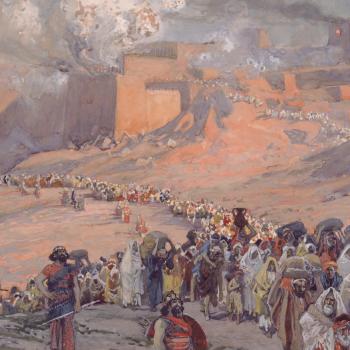
(Wikimedia Commons public domain image)
One of the principal architects of modern Islamic “fundamentalism” and, therefore, derivatively, of modern Islamic extremism (including such groups as al-Qaeda), was Sayyid Qutb (1906-1966), an Egyptian author and educator who was a leading member and theoretician of the Muslim Brotherhood in the 1950s and 1960s.
Qutb published prolifically, including twenty-four books — among them Social Justice, Milestones (Ma‘alim fi al-Tariq), and a thirty-volume commentary entitled In the Shadow of the Qur’an (Fi Zilal al-Qur’an) — and nearly six hundred articles. He also left behind roughly thirty unpublished books, many of which were destroyed by the Egyptian government. His writings are wide-ranging, including novels and literary criticism, but they are particularly focused on what he regarded as the optimal social and political role of Islam.
By the mid-1940s, many of his publications had been included in school, college, and university curricula, and he was followed by more than a few intellectuals, poets and other literary figures, and even some influential politicians. He and the political leadership of Egypt eventually parted company though, and, in 1966, he was hanged after having been convicted of plotting to assassinate Gamal Abdel Nasser, the president of Egypt.
Much of his commentary and his often fierce criticism was aimed at the Islamic world, but he also strongly disapproved of the society and culture of the United States. He had spent approximately two years in America, studying educational administration and working at Wilson Teacher’s College in Washington DC (a forerunner of today’s University of the District of Columbia), at the Colorado State College for Education in Greeley, and Stanford University, visiting many of the major American cities during his stay.
We Americans are often amazed at the hostility to us of some around the world, and we commonly imagine that merely to know us would be to love us. That certainly didn’t work out for Sayyid Qutb. He viewed America and Americans with increasingly intense dislike over the course of his sojourn in the country and beyond. He viewed even the Americans of several generations ago as materialistic, violent, and sexually obsessed. (In all honesty, having read some of his writing about America, it strikes me that a significant portion of the sexual obsession was his.)
As the years went by, Qutb came to believe more and more in violent, offensive jihad, and his direct or indirect influence on today’s jihadis and violent Islamists is considerable.
(And, yes, I’ve relied for much of the basic information above — e.g. public and objective information such as dates, numbers of books, and the like, the sort of thing that would appear in any responsible biographical entry anywhere — on the relevant Wikipedia entry. A note such as this, which I’m creating for future use, is the skeletal framework that I will later flesh out from other sources, credited where appropriate. The metaphor that comes to mind is a continual laying down of sediment in successive waves. To vary the metaphor: On this blog, you’re sometimes peering into my workshop, seeing various drafts. The final version, in sha‘ Allah, will appear in print.)
Postscript: One eager critic demands to know why I used Wikipedia rather than the Oxford Encyclopedia of the Modern Islamic World for the notes above. Well, for one thing, because I have no reason to believe that Sayyid Qutb’s years of birth and death and numbers of published books vary widely from one source to another. For another, because my copy of the Oxford Encyclopedia resides in my campus office, which I haven’t visited in more than a month. For yet another, because the lines above are only preliminary draft text; the Oxford Encyclopedia is almost certainly still in the text’s future. And, by the way, it shouldn’t be presumed that I’m unfamiliar with the Oxford Encyclopedia of the Modern Islamic World. I own a set. Moreover, I’m a contributor to it: I wrote its article on “Eschatology,” as well as articles on two of the most important sects of Shi‘ism: “Ismāʿīliyya” and “Zaydiyya.”












